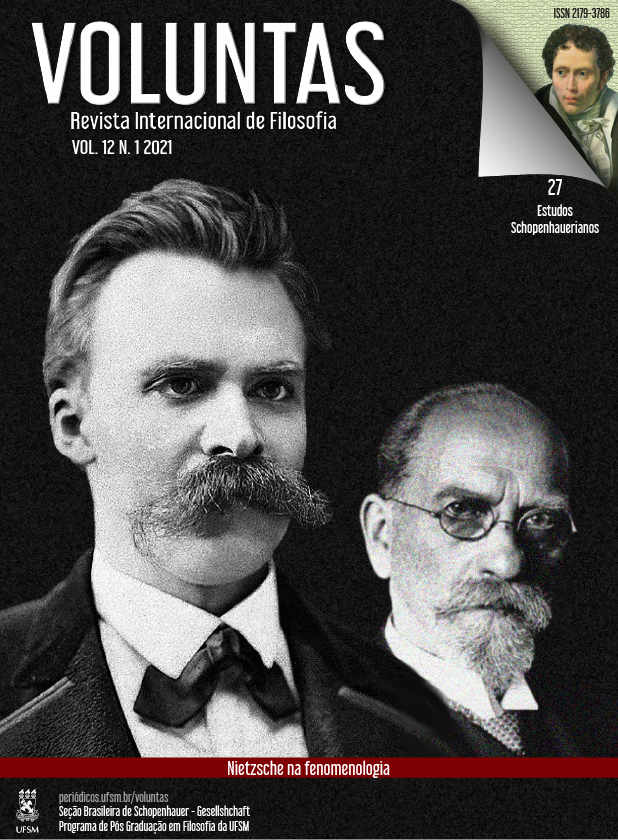Entre Nietzsche, Heidegger e o fim da metafísica: uma aproximação a partir da noção de vontade de poder
DOI:
https://doi.org/10.5902/2179378663949Parole chiave:
Heidegger, Nietzsche, Fim da Metafísica, Vontade de poderAbstract
Partindo da interpretação heideggeriana de Nietzsche pretendemos pensar a questão do fim da metafísica nos situando na contenda entre esses dois pensadores. Para isso, centraremos nossa análise na discussão sobre a vontade de poder. A maneira pela qual Heidegger interpretou Nietzsche como o filósofo do fim da metafísica, inserindo-o radicalmente nessa tradição, e o sentido que deu para a noção de vontade de poder é foco de discordâncias entre intérpretes “pós-heideggerianos” de Nietzsche. Por isso, trataremos de apresentar também uma outra versão da doutrina da vontade de poder, partindo de Müller-Lauter e dialogando com outros intérpretes, pois é nossa intenção mostrar que uma nova concepção da vontade de poder aliada à interpretação de uma ontologia não-essencialista em Nietzsche pode desvincular o filósofo de ter seu pensamento adequado à metafísica e ao mundo da técnica, tal como pensou Heidegger.Downloads
Riferimenti bibliografici
BAFFA, Manoella. A forma da metafísica – sobre a história na obra tardia de Heidegger. Rio de Janeiro, 2005. 199 p. Tese (Doutorado em filosofia). Departamento de filosofia. Pontifícia Universidade Católica do Rio de Janeiro.
BATISTA, Gustavo Silvano. “Nietzsche, Heidegger e o fim da modernidade: um estudo sobre Gianni Vattimo”. Perspectivas online. Vol. 5. n 1, 2008. p.28-32. Disponível em: <<https://www.seer.perspectivasonline.com.br/index.php/revista_antiga/article/viewFile/284/195>>. Acesso em: 22 de janeiro de 2021.
CABRAL, Alexandre Marques. Niilismo e hierofania: uma abordagem a partir do confronto Nietzsche, Heidegger e a tradição cristã. Vol. I e II. Rio de Janeiro: Mauad X, 2015.
CRAGNOLINI, Mônica. “Nietzsche por Heidegger: contrafiguras para uma perda”. In: Cadernos Nietzsche. vol. 10, 2001. p.11-25.
DELEUZE, Gilles. Nietzsche e a filosofia. Porto: Rés Editora, 2001.
DERRIDA, Jacques. Esporas: os estilos de Nietzsche. Rio de Janeiro: NAU, 2013.
ELDEN. Stuart. “A Thousand Year Conclusion? Machination and Calculation in the Nietzsche Lectures”. In: BABICH, B; DENKER, A; ZABOROWSKI. H. Heidegger & Nietzsche. New York: Rodopi, 2012. p. 343-357.
FOUCAULT, Michel. Nietzsche, Freud, Marx. Theatrum Philosoficum. São Paulo: Princípio, 1997.
HEIDEGGER, Martin. Nietzsche, vol I. Trad. Marco Antônio Casanova. Rio de Janeiro: Forense Universitária, 2007a.
HEIDEGGER, Martin.Nietzsche, vol II. Trad. Marco Antônio Casanova. Rio de Janeiro: Forense Universitária, 2007b.
HEIDEGGER, Martin. Ser e Tempo. Trad. Márcia Sá Cavalcante Shuback. Petrópolis: Vozes, 2009.
ITAPARICA, André. Luis Mota. “Nietzsche: crítica à metafísica como crítica à linguagem”. In: LIMA, M. J. S.; ITAPARICA, A. L. M. Verdade e linguagem em Nietzsche. Salvador: Edufba, 2014. p. 105-119.
MARTON, Scarlett. “A terceira margem da interpretação”. In: Müller-Lauter, W. A doutrina da vontade de poder. Trad. Oswaldo Giacoia. São Paulo:Annablume, 1997.
Müller-Lauter, Wolfgang. A doutrina da vontade de poder em Nietzsche. Trad. Oswaldo Giacoia. São Paulo: ANNABLUME, 1997.
Müller-Lauter, Wolfgang. Nietzsche: sua filosofia dos antagonismo e os antagonismos de sua filosofia. Trad: Clademir Araldi.São Paulo: Ed.da UNIFESP, 2009.
NIETZSCHE, Friedrich. Assim Falou Zaratustra: um livro para todos e para ninguém. Trad. e notas Gabriel Valladão Silva. Porto Alegre:: L&PM, 2015.
NIETZSCHE, Friedrich. Crepúsculo dos ídolos. Trad. Renato Zwick. Porto Alegre: L&Pm, 2016.
NIETZSCHE, Friedrich. Obras incompletas. Trad. Rubens Rodrigues Torres Filho. São Paulo: Abril Cultural, 1974.
NASSER, Eduardo. Nietzsche e a ontologia do vir-a-ser. São Paulo: Edições Loyola, 2015
NUNES, Benedito. O Nietzsche de Heidegger. Rio de Janeiro: Pazulin, 2000.
PÖGGELER, Otto. A via do pensamento de Martin Heidegger. Trad: Jorge Telles de menezes. Lisboa: Instituto Piaget, 2001.
STEIN, Ernildo. Introdução ao pensamento de Martin Heidegger. Porto Alegre: EDIPUCRS, 2011.
VATTIMO, Gianni. Diálogo com Nietzsche. Trad. Silvana Cobucci Leite. São Paulo: Martins fontes, 2010.
VATTIMO, Gianni. Fim da modernidade: niilismo e hermenêutica na cultura pós-moderna. São Paulo: Martins Fontes, 1996.
VATTIMO, Gianni. Las aventuras de la diferencia: Pensar después de Nietzsche y Heidegger. Trad.Juan Carlos Gentile. Barcelona: Edicions 62, 1986.
##submission.downloads##
Pubblicato
Versioni
- 2022-03-29 (3)
- 2022-03-29 (2)
- 2021-04-26 (1)
Come citare
Fascicolo
Sezione
Licenza
Copyright (c) 2021 Voluntas: International Journal of Philosophy

Questo lavoro è fornito con la licenza Creative Commons Attribuzione - Non commerciale - Condividi allo stesso modo 4.0 Internazionale.
La presentazione degli originali a questa rivista implica il trasferimento, da parte degli autori, dei diritti di pubblicazione stampate e digitali alla stessa, fatta eccezione dei diritti d'autore, che per gli articoli pubblicati rimangano all’autore, con diritti periodici sulla prima pubblicazione. Gli autori possono utilizzare gli stessi risultati solo in altre pubblicazioni che indicano chiaramente questa rivista come pubblicazione originale. Poiché siamo una rivista ad accesso aperto, consentiamo l'uso gratuito di articoli in applicazioni educative, scientifiche e non commerciali, a condizione che venga menzionata esplicitamente la fonte.






